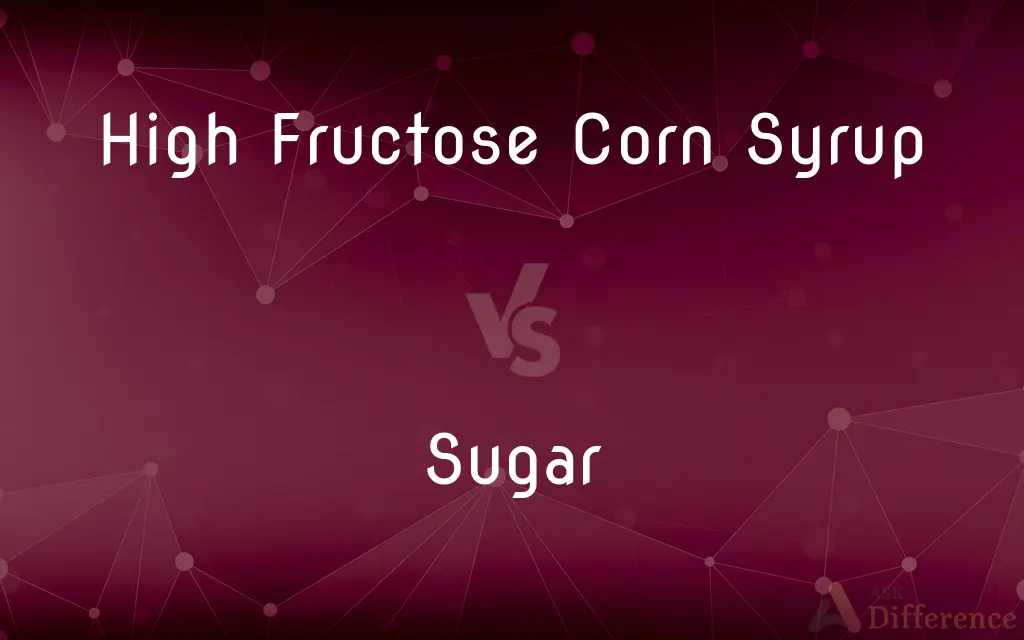High Fructose Corn Syrup vs. Sugar — What's the Difference?
By Tayyaba Rehman & Urooj Arif — Published on February 13, 2024
High Fructose Corn Syrup (HFCS) is a sweetener made from corn, with a high level of fructose. Sugar, often from sugar cane or beets, is sucrose comprising equal parts of glucose and fructose.

Difference Between High Fructose Corn Syrup and Sugar
Table of Contents
ADVERTISEMENT
Key Differences
High Fructose Corn Syrup (HFCS) and sugar are two widely used sweeteners in the food industry, each with distinct characteristics and sources. HFCS is derived from cornstarch and undergoes enzymatic processing to increase its fructose content, making it exceptionally sweet. Sugar, commonly referred to as table sugar or sucrose, is extracted from sugar cane or sugar beets and consists of a 50-50 ratio of glucose to fructose.
The production process of HFCS involves the enzymatic treatment of cornstarch to convert a portion of its glucose into fructose, creating a syrup with a high sweetness level. This makes HFCS a popular choice for food manufacturers due to its sweetness and liquid form, which is easy to blend into beverages and processed foods. In contrast, sugar is produced through the extraction and crystallization of sucrose from sugar cane or sugar beets, resulting in solid crystals or granules that are familiar in households and culinary applications.
One of the key differences between HFCS and sugar lies in their chemical compositions. HFCS can vary in fructose content, but the most common forms used in the food industry are HFCS-55 (which contains 55% fructose) and HFCS-42 (42% fructose). Sugar, on the other hand, maintains a consistent composition of 50% glucose and 50% fructose, bound together as sucrose.
The health implications of consuming HFCS and sugar have been a topic of debate among nutritionists and health experts. Some studies suggest that the body metabolizes HFCS differently than sugar due to its higher fructose content, potentially leading to health issues like obesity and diabetes when consumed in excess. However, both HFCS and sugar contribute to added sugars in the diet and are recommended to be consumed in moderation.
In summary, while HFCS and sugar serve similar purposes as sweeteners, their origins, production processes, and compositions differ significantly. Both have been subject to scrutiny regarding their health effects, emphasizing the importance of moderation in their consumption.
ADVERTISEMENT
Comparison Chart
Source
Derived from cornstarch
Extracted from sugar cane or sugar beets
Composition
Varies in fructose content, commonly 42-55% fructose
Consistently 50% glucose and 50% fructose
Form
Liquid
Solid crystals or granules
Production Process
Enzymatic processing to convert glucose to fructose
Extraction and crystallization of sucrose
Common Uses
Beverages, processed foods
General sweetening, baking, beverages
Compare with Definitions
High Fructose Corn Syrup
Subject of health debates due to its fructose content.
Nutritionists often discuss the health impacts of high fructose corn syrup.
Sugar
A sweet crystalline substance obtained from sugar cane or beets.
She added a teaspoon of sugar to her coffee.
High Fructose Corn Syrup
Produced through enzymatic treatment of cornstarch.
The production of high fructose corn syrup involves complex enzymatic processes.
Sugar
Comprised of equal parts glucose and fructose.
Sugar's molecular structure is a 50/50 split of glucose and fructose.
High Fructose Corn Syrup
Used extensively in processed foods and beverages.
High fructose corn syrup is a common ingredient in packaged snacks.
Sugar
Used universally in baking and sweetening.
Sugar is a staple ingredient in baking cookies.
High Fructose Corn Syrup
Known for its liquid form and high sweetness.
High fructose corn syrup provides a cost-effective sweetening option for manufacturers.
Sugar
Can be refined or unrefined, affecting its color and flavor.
Brown sugar adds a rich flavor to baked goods due to its molasses content.
High Fructose Corn Syrup
A sweetener derived from corn with a high fructose level.
Many sodas contain high fructose corn syrup for sweetness.
Sugar
A sweet crystalline or powdered substance, white when pure, consisting of sucrose obtained mainly from sugarcane and sugar beets and used in many foods, drinks, and medicines to improve their taste. Also called table sugar.
Sugar
Any of a class of water-soluble crystalline carbohydrates, including sucrose and lactose, having a characteristically sweet taste and classified as monosaccharides, disaccharides, and trisaccharides.
Sugar
A unit, such as a lump or cube, in which sugar is dispensed or taken.
Sugar
(Slang) Sweetheart. Used as a term of endearment.
Sugar
To coat, cover, or sweeten with sugar.
Sugar
To make less distasteful or more appealing.
Sugar
To form sugar.
Sugar
To form granules; granulate.
Sugar
To make sugar or syrup from sugar maple sap. Often used with off.
Sugar
(uncountable) Sucrose in the form of small crystals, obtained from sugar cane or sugar beet and used to sweeten food and drink.
Sugar
(countable) A specific variety of sugar.
Sugar
Any of various small carbohydrates that are used by organisms to store energy.
Sugar
(countable) A small serving of this substance (typically about one teaspoon), used to sweeten a drink.
He usually has his coffee white with one sugar.
Sugar
(countable) A term of endearment.
I'll be with you in a moment, sugar.
Sugar
A kiss.
Sugar
Diabetes.
Sugar
(dated) Anything resembling sugar in taste or appearance, especially in chemistry.
Sugar of lead (lead acetate) is a poisonous white crystalline substance with a sweet taste.
Sugar
Compliment or flattery used to disguise or render acceptable something obnoxious; honeyed or soothing words.
Sugar
Heroin.
Sugar
Money.
Sugar
(programming) syntactic sugar.
Sugar
(transitive) To add sugar to; to sweeten with sugar.
John heavily sugars his coffee.
Sugar
(transitive) To make (something unpleasant) seem less so.
She has a gift for sugaring what would otherwise be harsh words.
Sugar
In making maple sugar, to complete the process of boiling down the syrup till it is thick enough to crystallize; to approach or reach the state of granulation; with the preposition off.
Sugar
(entomology) To apply sugar to trees or plants in order to catch moths.
Sugar
To rewrite (source code) using syntactic sugar.
Sugar
(transitive) To compliment (a person).
Sugar
To remove hair using a paste of sugar, water, and lemon juice.
Sugar
(minced oath) Used in place of shit!
Oh, sugar!
Sugar
A sweet white (or brownish yellow) crystalline substance, of a sandy or granular consistency, obtained by crystallizing the evaporated juice of certain plants, as the sugar cane, sorghum, beet root, sugar maple, etc. It is used for seasoning and preserving many kinds of food and drink. Ordinary sugar is essentially sucrose. See the Note below.
Sugar
By extension, anything resembling sugar in taste or appearance; as, sugar of lead (lead acetate), a poisonous white crystalline substance having a sweet taste.
Sugar
Compliment or flattery used to disguise or render acceptable something obnoxious; honeyed or soothing words.
Why, do not or know you, grannam, and that sugar loaf?
Sugar
In making maple sugar, to complete the process of boiling down the sirup till it is thick enough to crystallize; to approach or reach the state of granulation; - with the preposition off.
Sugar
To impregnate, season, cover, or sprinkle with sugar; to mix sugar with.
Sugar
To cover with soft words; to disguise by flattery; to compliment; to sweeten; as, to sugar reproof.
With devotion's visageAnd pious action we do sugar o'erThe devil himself.
Sugar
A white crystalline carbohydrate used as a sweetener and preservative
Sugar
An essential structural component of living cells and source of energy for animals; includes simple sugars with small molecules as well as macromolecular substances; are classified according to the number of monosaccharide groups they contain
Sugar
Informal terms for money
Sugar
Sweeten with sugar;
Sugar your tea
Sugar
Central to discussions on dietary health and obesity.
Health experts recommend limiting sugar intake to reduce obesity risk.
Common Curiosities
How is Sugar produced?
Sugar is produced by extracting and crystallizing sucrose from sugar cane or sugar beets.
What are the health concerns associated with HFCS?
Concerns include its high fructose content potentially leading to obesity, diabetes, and other health issues.
What is High Fructose Corn Syrup?
HFCS is a sweetener made from corn that contains a high level of fructose.
What is Sugar?
Sugar, or sucrose, is a natural sweetener extracted from sugar cane or sugar beets, composed of glucose and fructose.
What is the main chemical difference between HFCS and Sugar?
HFCS has variable fructose content, while sugar is always 50% glucose and 50% fructose.
Can HFCS and Sugar be used interchangeably in recipes?
They can sometimes be substituted, but differences in form and sweetness may affect the recipe's outcome.
How do food labels indicate the presence of HFCS or Sugar?
Food labels list ingredients, including HFCS and sugar, often under various names.
Can reducing HFCS and Sugar intake improve health?
Reducing intake of added sugars, including HFCS and sugar, can contribute to better health outcomes.
Why is HFCS used in foods and drinks?
HFCS is used for its sweetness, liquid form, and cost-effectiveness in manufacturing.
Is Sugar healthier than HFCS?
Both contribute to added sugars in the diet and should be consumed in moderation, without a clear health advantage of one over the other.
Why do some prefer Sugar over HFCS in foods?
Some prefer sugar due to taste, concerns about HFCS's health effects, or a desire for natural ingredients.
What role do HFCS and Sugar play in the global diet?
They are significant sources of added sugars in diets worldwide, contributing to sweetness and calories in foods and beverages.
What are alternative sweeteners to HFCS and Sugar?
Alternatives include stevia, honey, agave nectar, and artificial sweeteners.
Are there environmental concerns associated with producing HFCS and Sugar?
Both have environmental impacts related to their agricultural and manufacturing processes.
How does the body metabolize HFCS compared to Sugar?
The body metabolizes fructose and glucose differently, which is a consideration in the health debate over HFCS and sugar.
Share Your Discovery

Previous Comparison
Ale vs. Lager
Next Comparison
Facebook vs. LinkedInAuthor Spotlight
Written by
Tayyaba RehmanTayyaba Rehman is a distinguished writer, currently serving as a primary contributor to askdifference.com. As a researcher in semantics and etymology, Tayyaba's passion for the complexity of languages and their distinctions has found a perfect home on the platform. Tayyaba delves into the intricacies of language, distinguishing between commonly confused words and phrases, thereby providing clarity for readers worldwide.
Co-written by
Urooj ArifUrooj is a skilled content writer at Ask Difference, known for her exceptional ability to simplify complex topics into engaging and informative content. With a passion for research and a flair for clear, concise writing, she consistently delivers articles that resonate with our diverse audience.
















































